#zofia czosnowska
Text
Józef Poniatowski’s children and descendants
Because a couple of months ago there’s been a discussion about Napoleon marshal’s children I decided I out to share with you the info about Józef Poniatowski’s issues and descendance.

Though never married, prince Józef nevertheless had two illegitimate sons.
The oldest one was Józef Szczęsny Mauricy Chmielnicki, born on the 17th of September, 1791.
The mother of the boy was most probably Poniatowski’s mistress of that time, the actress named Małgorzata Magdalena Wiktoria “Zelia” Sitańska (though there are as well versions it might have been another woman, for example, Zelia’s step-mother, also an actress - more on the topic I wrote here)
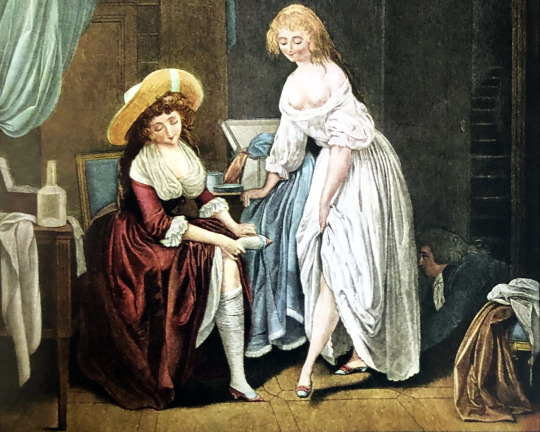
Zelia and here step-mother, a colored engraving
As for the fate of the boy - in his youth (before 1807) he started a military career in the Army of... Austria. Most probably it was prince Józef himself who arranged it, because his career started in the Austrian army too. (Another question is why Poniatowski didn’t “transfer” his son into the Army of the Duchy of Warsaw after the latter had been created, but, I’m afraid, we’ll never know the answer.)
And when in 1809 Austria attacked the freshly created Duchy, Józef Chmielnicki took part in the war... on the side of the Austrians. (And his father kinda accepted this, because in his will written 3 years later, in 1812, Poniatowski mentioned not only his firstborn but as well the fact that the latter was an officer in the Austrian Army.)
Chmielnicki fought as well in the next coalition wars, in 1812-1815 (against Napoleon as well), in 1831 he fought in defense of the Roman ecclesiastical state against local insurgents; for this he received the papal Order of St. Gregory. He also had the Austrian Military Cross. In 1856 he retired with the rank of colonel. He died unmarried in Vienna in 1860.
Unfortunately, I wasn’t able to find any image of Józef Chmielnicki, but in his military service records there is a little bit on his appearance:
Tall, of good health, very lively temperament and honest and reliable character. Polite and tidy; sometimes a bit violent and not always consistent. Zealous and active, with a special penchant for service in rifle units. He was wounded twice. He is fluent in German and Polish in speech and writing, speaks French and a little Italian. A very good staff officer, suitable for a regiment commander.
More do we know about Prince’s Józef’s other son, who was born on the 18th of December, 1809 in Warsaw and was then was given the name Józef Karol Ponitycki.
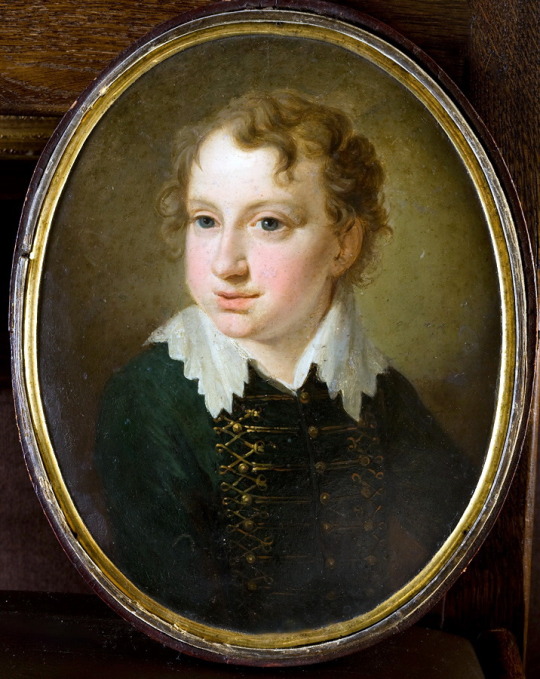
Józef Peszka, Portrait of Józef Ponitycki, 1815
As for Józef the second mother - there are no doubts in it, it was prince Poniatowski’s another mistress, Zofia Czosnowska née Potocka (more about her - here).
Though Czosnowska was married, prince Józef acknowledged her child and mentioned him in his will.
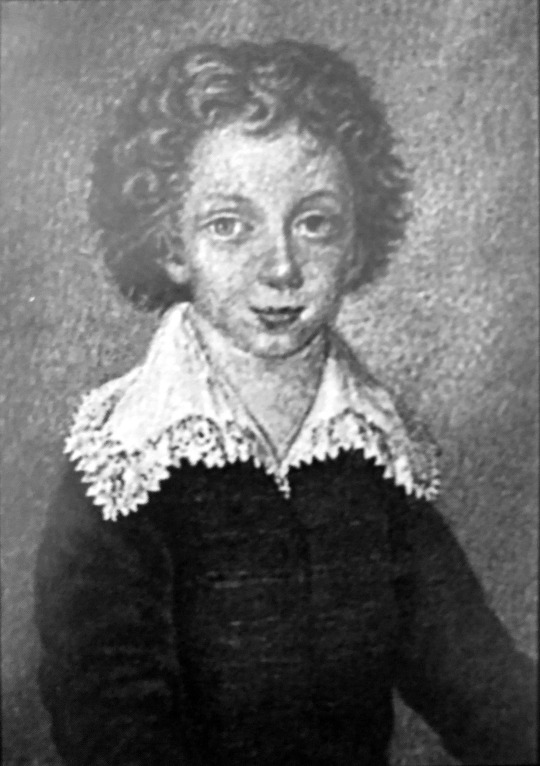
A miniature showing Ponitycki at the age of ten
The boy’s mother, however, didn’t care for her child much. Having divorced her official husband she married again in 1815, then placed her son in the custody of his aunt, prince’s Józef sister countess Maria Teresa Tyszkiewicz.
In the 1821 countess Teresa became the boy's legal guardian (Czosnowska officially gave him up) and in 1828 adopted him, changing his surname from Ponitycki to Poniatowski and adding Maurycy (Maurice) as his third name, thus making the boy the namesake of her long-term love Charles Maurice de Talleyrand.
And a little bit before, in 1826, Józef the younger gained French citizenship, and at the age of 18 (1827) he volunteered to join the French army.
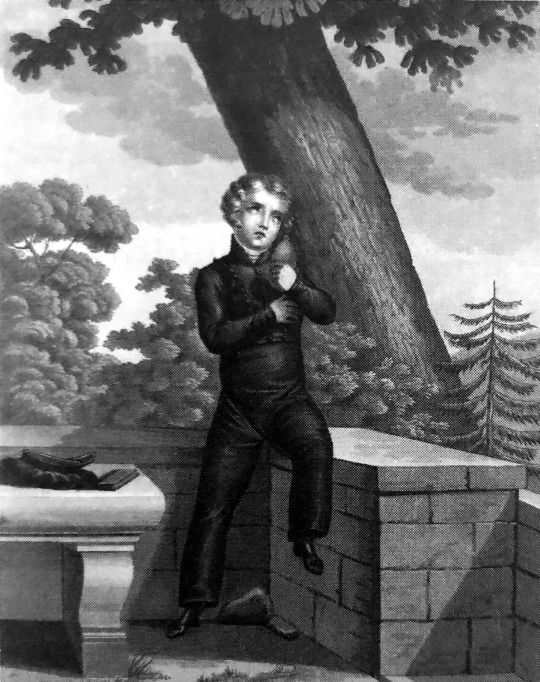
An anonymous painter, Prince Józef's son grieving after his father, 1820
The enlistment papers say that he was a healthy, blue-eyed, tall (1.79 m) blond, oval face, strong chin and aquiline nose. After graduating from school, he took part (as chasseur sergeant) in the Greek campaign in the Peloponnese (1829), later he was transferred to Algiers (1830), but he quickly returned to France.
During the July Revolution in Paris that year Poniatowski was among those soldiers who were putting it down, but when a year later the November Insurrection broke out in Poland he, together with his friend, Count of Montebello, a son of the Marshal Lannes, went to Poland to join the uprising. After the fall of the uprising, Józef returned through Galicia to France, where joined the rifle regiment as a captain and took part in the war in Algiers with Abd del-Kader in the years 1832-1836.
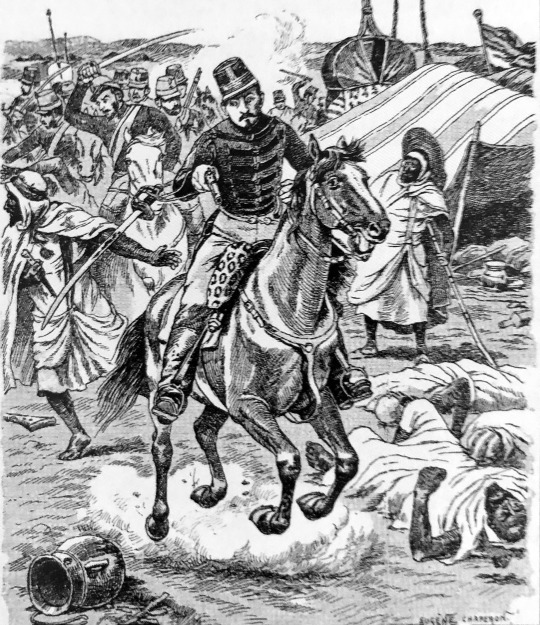
Józef Ponitycki-Poniatowski charges the camp of Emir Adb-el-Kader, a drawing by a French painter Eugène Chaperon
In 1839, driven by longing for his homeland, Poniatowski came to Kraków and made efforts to obtain permission to return to Warsaw. But the Russian Governor Paskevich refused him entrance and even tried (unsuccessfully) to confiscate) properties Józef inherited from his father and aunt.
Not being allowed to return to Poland, Poniatowski returned to France and to his regiment. He died on February 15, 1855 in Tlemcen, Algeria, and was buried there.
As for Józef Karol Poniatowski’s private life - in 1836 he married an Englishwoman, Maria Anna Semple. They have two children - a son, Józef Stanisław, born in 1837, and a daughter, Maria Teresa, a year younger.
Józef Stanisław joined the army at the age of 17 and went on the Crimean campaign. During the siege of Sevastopol, he was appointed lieutenant for his bravery. He then served in the cavalry regiment. He left the service due to ill health. In 1866 he married Léonide Marie Victoria Charner, the daughter of a French admiral, the chief commander of a sea expedition to China.
Six weeks after his marriage with Léonide Charner in 1866 he became mental ill. From 1880 until his death July 20, 1910 in Geel, Belgium, where he resided as a psychiatric patient in the wellknown Geel "Colonie des Aliénés''. (Many thanks to Werner for providing me with this information).
As for Józef Stanisław’s issue - there we have a kind of discrepancy. According the Polish sources like, for example, the Genealogy of the Descendants of the Great Sejm , he died childless but according his profile at geni.com he did have a son, named André whose descendants still live in the US. (The site doesn’t allow to see all the data but it is highly probably that the direct male line continues till our days.)
Maria Teresa, after the death of her father, was taken care of by the Duchess d'Eckmühl, the widow of the Marshal Davout. In 1859, Maria Teresa married Louis de Guirard, Comte de Montarnal, grandson of Marshal Ney. He was an official in the Ministry of Treasury. They had seven children: three sons and four daughters. But neither of those, according both the Genealogy of the Descendants of the Great Sejm and Geni.com had issue.
What’s more, according Geni.com Józef Karol Poniatowski after the death of his first wife married again. That time he took as a wife a woman named Elżbieta Fuchs, and they have a son named Wojciech Józef. That Józef, it looks like, was married, but no information about his issue is provided.
#Poniatowski#józef poniatowski#zelia sitańska#Józef Szczęsny Mauricy Chmielnicki#zofia czosnowska#Józef ponitycki#józef karol maurycy poniatowski#józef poniatowski's children#józef poniatowski's descendants#józef peszka#eugène chaperon
22 notes
·
View notes
Text









Józef Poniatowski (1763-1813).
Marshal of France.
.
He was a Polish leader, general, minister of war and army chief, who became a Marshal of the French Empire.
.
A nephew of King Stanisław II Augustus, his military career began in 1780 in the Austrian army, where he attained the rank of a colonel. In 1789, after leaving the Austrian service, he joined the Polish army. Poniatowski, now in the rank of major general and commander of the Royal Guards, took part in the Polish–Russian War of 1792, leading the crown forces in Ukraine, where he fought a victorious battle of Zieleńce.
.
In 1794 he participated in the Kościuszko Uprising and was in charge of defending Warsaw for which he was subsequently exiled. In 1798 Poniatowski was permitted to return, however, he refused the offer to serve in the Imperial Russian army submitted to him by Tsar Alexander I.
.
In 1806, after the creation of the Duchy of Warsaw, he was appointed the minister of war. In 1809 he commanded a 16,000-strong army during the Austro-Polish War and achieved tactical success over a larger and more experienced Austrian force in the battle of Raszyn. The conflict ended with a Polish victory which allowed the Duchy to partially recover lands once lost in the Partitions of Poland.
.
A staunch ally and supporter of Napoleon I, Poniatowski voluntarily took part in the French invasion of Russia. He was injured during the fighting for Moscow which eventually forced his return to Warsaw, where he worked on the reconstruction of the Polish Armed Forces intended to fight in Germany. He was made Marshal of France during the battle of Leipzig ("Battle of Nations"). On the last day of the battle the wounded Marshal died in an attempt to cross the Elster River on horseback.
.
He had two sons with his two partners: Zelia Sitanska and Zofia Czosnowska. He also had a relationship with countess Marie-Scharlotte von Thun.
[Submission]
#history#beauty#historical babe#historical crush#historical hottie#history crush#history babe#history hottie#hottie#submission#19th century#jozef poniatowski#polish history
41 notes
·
View notes
Text
Why Józef Poniatowski never married
“A man with a reputation of a womanizer, with a couple of illegitimate children - and not married? Why so?” Knowing my interest in prince Poniatowski different people from time to time ask me these questions. So I decided to write this post to clarify the issue.
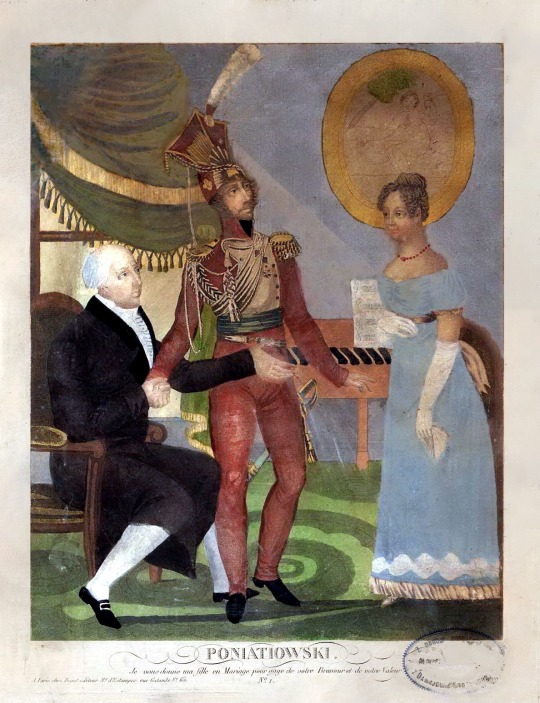
Prince Józef making a proposal, an engraving by F. Begat, 1821, from a French aquatint series illustrating Poniatowski’s life and death events - a completely imaginary, but the best illustration combining both the topics of “Poniatowski” and “marriage” I was able to find.
And to understand why Pepi remained a bachelor to the end of his days we need to have a look at his whole life, starting from the younger years.
Because when prince Poniatowski was in his twenties he did want to marry, to make his first love, the Austrian countess Karolina von Thun, his wedded wife.

Maria Carolina Anna von Thun, miniature brush by Anna Hochstädt (based on the original by Friedrich Heinrich Füger).
But, as I wrote in the post dedicated to prince Józef’s women, Pepi’s uncle, the Polish king, didn’t allow the nephew to associate himself with a girl of his choice. So, in the first case Poniatowski didn’t marry because he was prohibited to.
Furthermore, the king had his own ideas on which families it would have been convenient to become related with ordering prince Józef’s hands to their daughters. Among them there were a couple of cousins Czartoryskis (Maria and her younger sister, Zofia). Then Krystyna - the daughter of Ignacy Potocki. And one more girl - from Rzewuski family etc. (But all these projects remained on paper, and I am not even sure whether Józef knew about them.)
Anyway, the pressing of necessity to obey his uncle-king in matrimonial matters remained with prince Józef at least until Stanisław’s August abdication in 1795 (if not till 1798, when the latter died). And Pepi was finally “free” his first love wasn’t free anymore.

Élisabeth Vigée Le Brun, portrait of Lady Gillford, nee Marie Caroline von Thun, ci. 1792-95.
Yes, in 1793 the countess von Thun became the wife of a British diplomat, lord Gillford.
And approximately at the same time in Pepi’s life there appeared another lady, a Frenchwoman named Henriette de Vauban.

Felicja Pichor-Śliwicka as Henriette de Vauban and Józef Węgrzyn as Józef Poniatowski in Jan Adolf Hertz’s play “Prince Jozef Poniatowski”
First she accompanied prince Józef and his sister during their travel around Europe. And later, when in 1798 Poniatowski settled down in Warsaw, Madame de Vauban not only moved together with him into his famous palace “Pod Blachą” but quickly took on herself responsibilities of the “hostess”.

An unknown painter, a miniature portrait of Henriette de Vauban, ci. 1789
And the presence of Henriette in prince Józef’s life is thought by French (and even some Polish) historians to be a reason of Poniatowski’s indisposition to “tie the knot”.
Yes, being from 1798 to 1806 a Prussian subject and a private person Poniatowski theoretically could propose whoever he wanted. But Madame de Vauban was, from one hand, already married. And, from the other hand, she was giving prince Józef enough comfort not to seek consolation in a marriage with another woman.
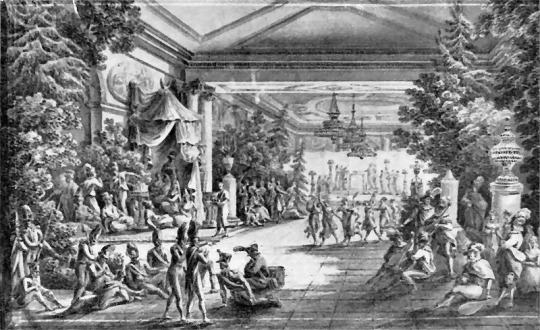
The feast arranged on occasion of prince Jozef’s birthday in the former royal library at the castle in Warsaw, Zygmunt Vogel, 1808
So it may be stated that prince Józef didn’t marry Madame de Vauban because she wasn’t eligible, and didn’t choose any other woman because he didn’t want to.
Ok, you may ask, and what about Zofia Czosnowska, the woman who gave birth to Poniatowski’s second son?
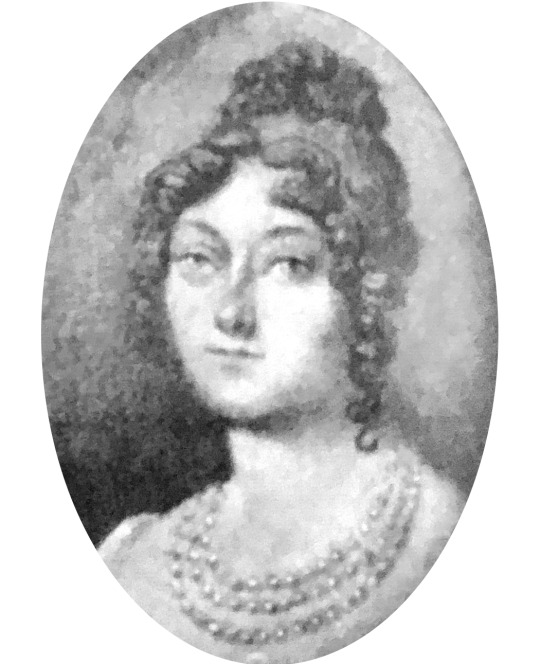
An unknown painter, a miniature portrait of Zofia Czosnowska
Considering this lady we first need to keep in mind that she herself was also married. (And though she separated from her first husband even before she became Pepi’s mistress, their formal divorce happened much after Poniatowski’s death, she during the time of his life Zofia Czosnowska wasn’t free either.)
An aside I couldn’t help but write: with all Pepi’s feelings towards beautiful Zofia, her appearance in his life didn’t change prince Józef’s lifestyle. As if nothing had happened Henriette de Vauban continued to live in Poniatowski’s house, prince Józef mentioned her in his will of 1812, and even shortly before his death he is recalled to say that “When it comes to dying ... to the afterlife I will take with me the unearthly smile of Henrietta ...”. All this IMHO eloquently says whom he really was attached to.
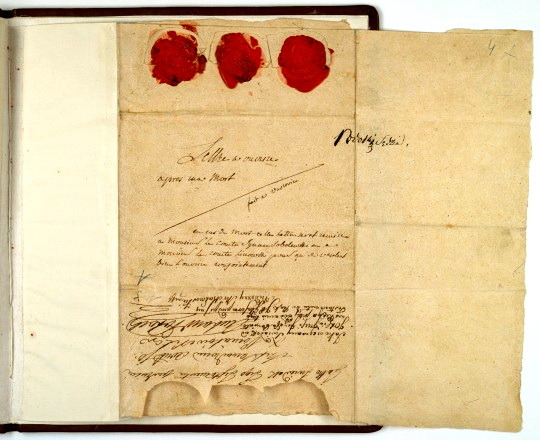
Poniatowski’s will
And there is one more thing we should take into account when looking at prince Józef’s later years. Namely - the creation in 1807 the Duchy of Warsaw.

Napoleon issuing the Constitution of the Duchy of Warsaw by Marcello Bacciarelli (1811)
Because this event, definitely positive for prince Józef’s motherland, simultaneously turned him from a private person to a public one, with all the consequences. And though Napoleonic code, from one hand, allowed divorces, the emperor, on the other hand, preferred to arrange marriages to his people by himself. Which means that had prince Józef acquired a desire to marry a woman he liked he first should have persuaded Napoleon to approve such a choice. And this again put Poniatowski in a kinda gloomy state like it had been years ago when he was dependent on the wishes of his monarch. And this fact may in my opinion served an explanation if to ask why Pepi didn’t divorce one of his mistresses from her husband and marry her...
And the last but not the least. Yes, by many people prince Józef is thought to have be a womanizer, but the more I learn about him the am I becoming convinced, that this might been a kind of “exaggeration”.
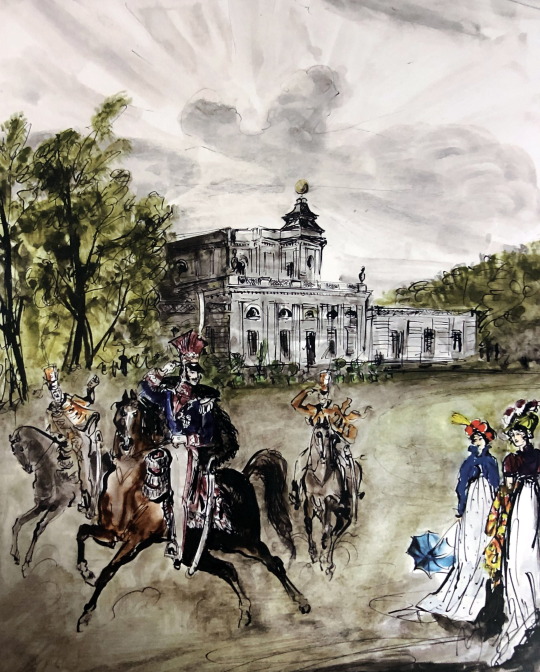
Antoni Uniechowski, prince Józef Poniatowski in Jabłonna, 1975
Because many a diarists recall that “he liked women, and women liked him”, but precise names are rarely mentioned, and if to count the ones of Poniatowski’s proven “love interests” the number is in fact not very high (especially to compare with such known “ladies' man” from the epoch like Napoleon, Talleyrand, Murat etc..)
#Poniatowski#józef poniatowski#józef poniatowski’s women#henriette de vauban#zofia czosnowska#karolina von thun
14 notes
·
View notes
Note
Following on from JoachimNapoleon's ask, I wanted to ask what you know about Poniatowski's relationship with women, especially since you're Polish yourself. From what I've read, he had affairs with many women but two women stand out: Zelia Sitanska (a songstress by trade) and Zofia Czosnowska (formerly Countess Potocka). What can you tell me about his love life? Also thanks for the follow!
Oh, this is an interesting topic, thanks for asking!!! And though I have already posted this info in my Insta (in Polish) I would be delighted to translate it to English and post it here.
So, let’s go!
Józef Poniatowski’s women.
Part I. His “documentary proved” love interests.
1.

Number one in the Poniatowski’s love interest will be his first love, Maria Carolina Anna von Thun und Hohenstein.
She was an Austrian and 6 years younger than Pepi (born on May 19, 1769), and they met by in Vienna in the late 1780s. She was charming and musically talented, and he fell in love with her to such a degree that even considered an option to propose. In a letter to his sister Poniatowski wrote that Karolina seemed to him to possess the most characteristics of the ideal woman and that if he were independent and if Karolina would have agreed to wait for him he would be find his happiness with her.
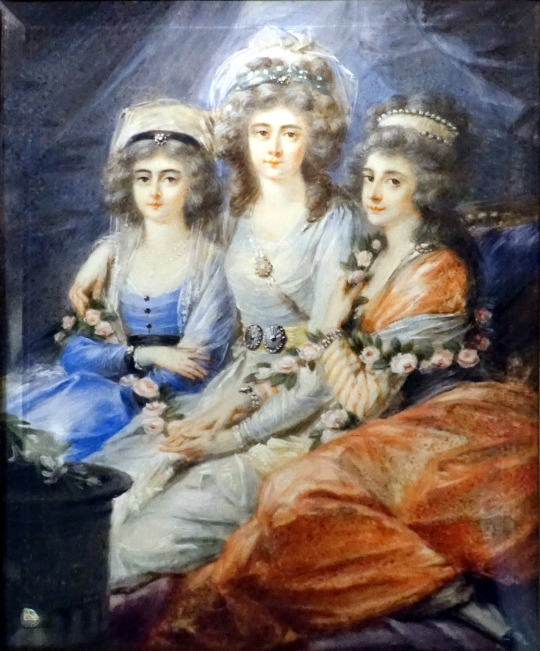
(Carolina - on the right - with her sisters)
But, unfortunately, the fate of Prince Józef at that time depended on the will of his uncle, King Stanisław August, and the latter had completely different intentions towards the nephew. Therefore, in 1788, Pepi, instead of proposing to his chosen one, had to leave Vienna for Warsaw.
And with that is, alas, how the story of these two ended... Because when the last king Poland died ten years later, Carolina von Thun was already a married. But before giving her hand to the Englishman, Lord Richard Guilford, she waited about five years (the wedding took place in October 1793.) And though sources are silent on the topic whether Caroline shared Pepi’s feelings or not, the latter fact in my opinion suggests that she did.
As for Pepi himself - the news about Caroline’s wedding (as well as her premature death - in 1800, at the age of only 30) caused in him a serious depression. Which in turn made it easier for another woman to appear in Poniatowski’s life. The woman who consoled Pepi’s broken heart and helped him to survive that hard time...
But before turning our attention to her we should recall another another person ))
2.

An actress and a mother of prince Jozef’s firstborn.
Her name was Margareth (Małgorzata) Magdalena Wiktoria, she was born in 1767, being a daughter of an actor Leon Sitański she became an actress herself.
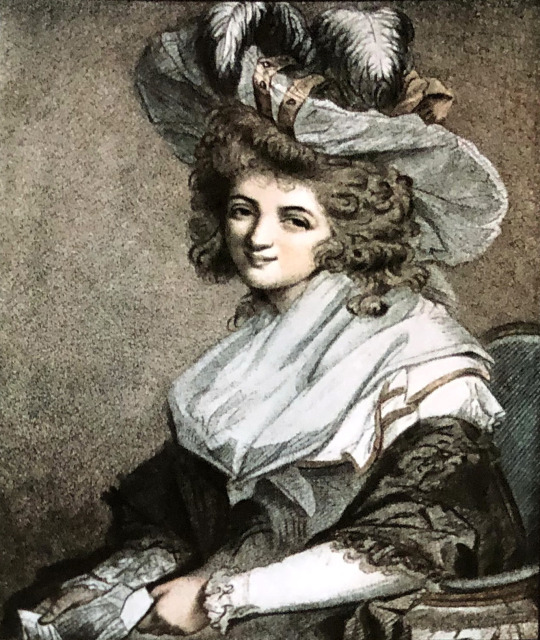
The actress Sitańska, engraving from that time
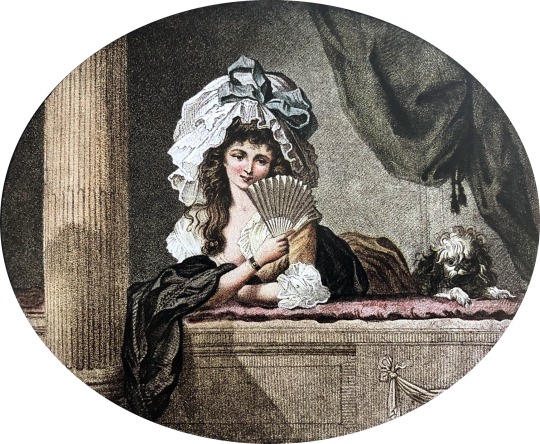
Pregnant Zelia in a theater box, engraving from that time
On September 1791, in Poniatowski’s absence (he was on the military training with his regiment) Zelia gave birth to a boy. The child was christened as Józef, and in the birth certificate was written as a son of a nobleman Józef Chmielnicki, an officer in the imperial service, and his wife Małgorzata née Narbutowicz. (Well, can’t help mentioning theories that the real mother of the boy might have been that Małgorzata Narbutowicz, or another actress of surname Sitańska - Dorothea, Zelia’s stepmother. But, frankly speaking I don’t think all this very plausible)
In any case, whoever the mother of the boy was, the father was certainly Poniatowski, what the prince confirmed again 20 years later, mentioning Jozef Chmelnicki in his will in 1812. (Although the latter was then an officer in the ... Austrian service).
And what about Zelia? It is not known for sure how long their relationship with Pepi lasted.
On one hand, in 1793 in Brussels the prince already met the woman who would be present in his life till his death. But, on the other hand, diarists recalled that in 1794, during the Kościuszko Uprising, Poniatowski "departed for Warsaw ... to his dear Sitańska, leaving the position in danger". Either way, the death of the actress in 1796 naturally put an end to the relationship.
As for Prince Joseph's son, he survived both his alleged mother and father. In 1813 (and later) he fought again on the side of the Austrians. And died in Vienna, after 1860, single and childless.
And now let’s finally move to the woman mentioned above.
3.

Six (or may be even ten) years older than prince Jozef, and maîtresse-en-titre of Poniatowski’s last 20 years of life.
Henriette de Vauban, née de Puget de Barbentane. A Frenchwoman, born in Paris on May 10, 1757. On June 18, 1775, she married a count (after other source - a marquis) Jacob-Anne-Joseph Le Prestre de Vauban. After Revolution outbreak Mme de Vauban emigrated to Brussels. And there, in the house of Poniatowski’s sister Theresa Tyszkiewicz Henrietta in 1793 met Pepi.

A miniature portrait of Mme de Vauban
In 1794 Poniatowski left Belgium to join the Kościuszko Uprising. But a year later, when he settled after Uprising’s fall in Vienna his sister joined him bringing with herself her friend Henriette.
And three years later, when after the death of his uncle Pepi moved to Warsaw, his sister and Mme de Vauban accompanied him again. (Some diarists mentioned that in the first years of life in Warsaw Henriette was accompanied by her husband, but it most probably he came there because he was a member of the entourage of Ludwik de Bourbon, Count of Provence, whose stayed in Warsaw that time)
In Warsaw Pepi settled in the Copper-Roofed (“Pod Blachą”) palace. And Henrietta - as the maîtresse-en-titre - became the “house mistress”. And though she didn’t stay the only woman in the prince's bed in the next 15 years Poniatowski had warm feelings towards her until the end of his life.
(However - can’t help but menton - the Polish diarists of the period recalled Henrietta as a capricious and impetuous person, devoted of beauty. And also accused her of taking advantage of her lover, for "selling" invitations to Blacha, and lending money to Prince Józef, which he himself had previously given her. French source, nevertheless, are more benevolent, stating that Mme de Vauban had charming smile and a soft, pleasant voice. And naming her as a reason why Poniatowski never married.)
And the will prince Jozef wrote in 1812 states, in my opinion, that Henriette wasn’t that bad as she was described by the Poles. Because Pepi left her a large sum of money, and mentioned "the kindness and gratitude that her heart gave him and which, even with death, will not end". And when, in 1813, when, having returned from the Moscow campaign, prince Jozef had again to leave Warsaw with the army, Mme de Vauban accompanied him to Kraków.
Little, however, is known about what happened to Henriette after Poniatowski’s death. One of the diarists recalled that after receiving the news of the battle of Leipzig Mme De Vauban was “drowned in tears and desperation; shut up and does not accept anyone.” Another historian found out that in 1816 she was still in Warsaw, busy with the matters of the inheritance received from Prince Józef. And finally, in French sources I managed to find that Mme de Vauban died on February 24, 1829, in Pantin.
And now the last woman, about which it is known for sure she had a relationship with Jozef Poniatowski.
4.

Twenty years younger than him, a mother of his second son and... unfaithful?
Sophia (Zofia) Czosnowska née Potocka. She was born in 1782 (some sources say even in 1787), so she was almost 20 - if not 25 - years younger than Prince Józef. In 1808, when they met, she was already a wife of a distant relative of hers, had a son and even manage to separated from her husband (the latter, by the way, was even older than Poniatowski).
The diarists of the epoch recall Czosnowska as "a very shapely blonde with beautiful facial features, large blue eyes and a charming smile" who "turned her heads by the dozen". So small wonder that Prince Józef succumbed to her spells.

Sophia in Paris in 1830th
Becoming his lover, beautiful Sophia did with Pepi whatever she wanted. It was for her "charming eyes" that he organized dances in Advent in 1808. A year later, after his victory over the Austrians, he stayed in Krakow for several months, she joined him there.
But at the end of the year she returned to Warsaw and it was there that in December 1809 her second son was born. At baptism, the boy was given the name Józef and the surname - Ponitycki, because Pepi, of course, considered this child his own. Although, as Anna Nakwaska mentions in her letters, Czosnowska did not lack other admirers (a certain Szołdrski and an officer named Gawar were mentioned among them). But Prince Józef, according to the same Nakwaska, did not care about such a state of affairs at all, living with it all "in the best harmony".
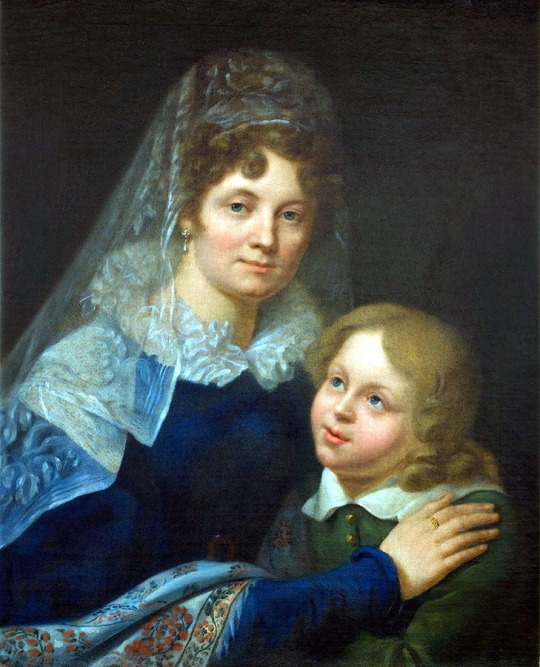
Józef Peszka, Zofia née Potocki Czosnowska with her son Józef Ponitycki
In 1813, when Prince Poniatowski and his army went to Krakow, Czosnowska, together with Mme de Vauban, accompanied him again. When the news of the death of the prince near Leipzig reached Poland, she played the role of a "pained widow". (Although she was very dissatisfied with the ordinances from Pepie's will concerning her and her son.) And a year later, at the Congress of Vienna, she had another affair.
Then she finally divorced her first husband, and in 1822 she again stood on the wedding carpet, this time with Aleksander Oborski. The marriage lasted 10 years, the spouse gave his surname to two of his wife's illegitimate daughters, but eventually took his own life by committing suicide.
After her husband's death, Sophia Oborska lived the life of a merry widow for some time, but at the end of her life she entered into a trial with her own children. Died, indebted and abandoned by relatives, in Wiesbaden in 1857.
———————————————————————
And these four were the only women about which is definitely known Józef Poniatowski did have feelings for. Of course, there were some others, but about all of them - including the emperor’s sister Pauline - we can state that they were love interests of Pepi with this or that degree of probability.
Of course, I am going to write about them as well (first in my Instagram, then here), so, please, stay tuned!
#józef poniatowski#karolina von thun#zelia sitańska#henriette de vauban#zofia czosnowska#photoshop#józef poniatowski’s women
34 notes
·
View notes
Note
5 13 16
Answers to the “Favourite Historical Figure: Ask Game”. Part II
5. What is the most ridiculous statement on them you have ever read?
Very funny question, thanks for picking it up! A friend of mine once stumbled upon a statement (in a dicussion on Facebook) that apparently Poniatowski would every morning have a special “cosmetic treatment”: “the butler would pull the skin of prince Józef’s face to the back and tied the excess under his hair with a velvet ribbon.”
Sounds ridiculous, isn’t it? I thought the same, and was very happy, being not able to find a proof of this in my vast collection of books and articles on the topic.
So I think I’d better give also another statement, more plausible one. As I wrote before, in his forties prince Józef was already bald and had to wear a wig. To do this was not a big problem for Poniatowski, but when the Frenchmen arrived to Warsaw and introduced to the high society their, much more lively, than the Polish ones, dances, there appeared a kind of issue. Because when Pepi had to jump, implementing figures of quadrille, his wig “jumped” together with him, making thus visible the absence of hair on the head. ))
13. If you had the chance to meet them, what is the first thing you would ask them?
Frankly speaking, first I had no answer for this, because having “met” prince Józef in the universe where such a thing might be possible I would only tell him how much I like and appreciate him.
But then I recalled a thing from Poniatowski’s biographies wrtitten in the 19th century which bothered me a lot. Namely - the statement that all the merry life he led, especially between 1795 and 1806, was a kind of “diversion”, to make the Prussians and the rest think he was a light-headed bon vivant, and not a man capable to something serious. But from what I read about the people of the 18th century (and mentally prince Józef definitely belonged to them) it was quite possible for the person of that type of mind to be a patriot and fun-loving human being at the same time.
So my question might have sounded as:
“Mon prince, please, please confirm me, that during all those famous balls and parties you did really have fun?“
16. Do you have an OTP involving your favourite historical figure?
To answer this one I had to Goofle first what does OTP mean, and, frankly speaking, I am still not sure whether I got it correctly. But nevertheless I’ll try.
If to consider as the OTP a person from the real women Józef Poniatowski had relationship with, there may be two candidatures. Many of historians state, that Pepi’s only true love was his first love, Karolina von Thun. Some of them, however, think that the love of his life might have been Zofia Czosnowska.
As for me - from all the women he had feelings towards most of all I like Henriette de Vauban. Why? At least because that from the age perspective I am more close to her (I am almost 41), than to the rest of his women. (But this is a topic definitely out of this post’s scope.)
Ok, this all was about women who really existed. But if to consider OTP in a wider context, taking into accout fanfiction as well, the situation will look a little bit different. Because in literature (at least in the Polish one) prince Józef had a lot of “additional” love interests. And there is person who is mentioned by more than one author - the princess August of Saxony. She existed in reality, and for sometime was even considered as Pepi’s potential bride, and - everything points to that - she was deeply in love with prince Józef. But he himself was more than indifferent both to her and to the prospect of marrying (not only Augusta), but any other woman, so the romantic relationship of this couple belongs completely to the realm of fiction.
But my OTP is not Augusta. And, frankly speaking, I had some doubts whether I should write about the below mentioned at all. But, because the question is asking about “my” character, and I have already mentioned you that I am writing a fan-fiction (I started it in 2018 and it is not finished yet), my answer will be “yes, I have, and it is a girl whom I invented”.
As for an illustartion of this post let me use one image only - because it in fact suits all the three questions asked. (And if I am to post so many images as I do this week even I might soon run out of them.)
So, please, meet Prince Poniatowski dancing with a lady, from Waldemar Łysiak's book "Erotic life of Prince Józef":

4 notes
·
View notes